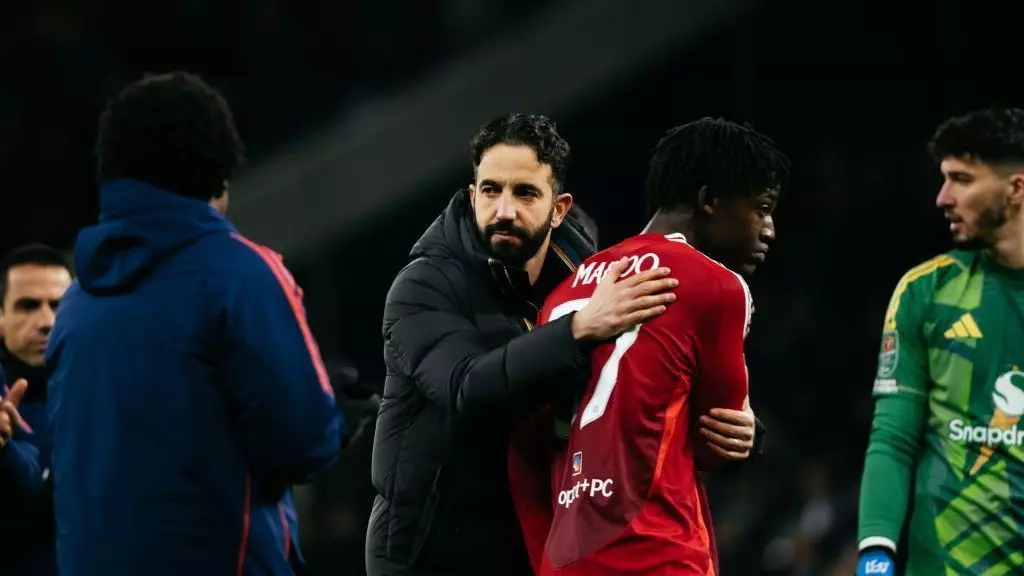Ruben Amorim’s decision to exclude Marcus Rashford from the Manchester United squad has sparked considerable debate among fans and analysts alike, especially following a heart-wrenching 4-3 defeat against Tottenham Hotspur in the Carabao Cup quarterfinals. Rashford, a key player known for his attacking prowess, was notably absent for the second consecutive match, following his omission from the previous game against Manchester City, which United won 2-1. This trend raises pertinent questions about the balance between individual talent and team dynamics in sports.
Amorim, however, stands firm in his conviction that his choices are ultimately for the greater good of the team. In the face of increasing scrutiny, he maintained his stance, stating, “I do the right thing for the team, so it’s never a mistake.” His position suggests an unwavering faith in his broader vision for Manchester United, one that prioritizes collective effort over individual brilliance. This line of thinking operates under the premise that team cohesion and tactical discipline can outweigh the raw talent of any single player.
During the Tottenham match, United exhibited moments of potential recovery, rallying from an initial 3-0 deficit to narrow the gap to 3-2. However, the resilience displayed on the pitch highlights the psychological and tactical challenges facing the team. Amorim noted that an eight-minute lapse at the start of the second half proved pivotal in sealing their fate. “We control the possession,” he remarked, indicating that while the team held the ball effectively, their inability to maintain focus at critical junctures ultimately led to their downfall.
The concept of a team’s mental fortitude is crucial in understanding this incident. Football matches can pivot on fleeting moments of disconnection, and how a squad responds in these instances can define their overall success. Amorim’s frustration is palpable; despite recognizing commendable efforts from his players to recover, the sinking realization that individual errors and lapses can reshape the outcome is an ever-present undercurrent.
In addition to team dynamics, the performance of both goalkeepers was a significant factor in this match. United’s Altay Bayindir, who replaced regular starter André Onana, made critical mistakes that did not go unnoticed. Meanwhile, Tottenham’s Fraser Forster was similarly plagued by errors, leading to frustrations on both sides. Forster’s misjudged back pass showcased how psychological confidence can be shattered by pressure, affecting not only individual players but the team as a whole.
Postecoglou’s remarks regarding Forster underscored the need for resilience in the face of setbacks. He praised the goalkeeper’s previous performances and expressed confidence that, despite the mistakes, Forster would bounce back. This speaks volumes about the role of management in maintaining player spirits after disheartening experiences. Indeed, clear communication and support structures are integral for teams navigating tumultuous periods both on and off the pitch.
Looking forward, Tottenham’s victory delivers them a semifinal clash against Liverpool, while Newcastle prepares to face Arsenal. For Amorim and Manchester United, the journey is fraught with questions about team integrity and individual responsibility. Rashford’s public acknowledgment of wanting to depart from the club complicates matters further, introducing a potential rift within the squad that needs healing.
Ultimately, Amorim must weigh strategic decisions with the delicate dynamics of team morale. Success in football often hinges on adaptability and swift recovery from both victories and setbacks. As the implications of his choices unfold, it remains to be seen whether Amorim’s approach will yield the desired outcomes in the long run, or if these decisions will leave a lingering impact on the club’s ambitions and Rashford’s future. For fans and stakeholders alike, the overarching narrative will center on how leadership translates into performance and unity within a high-stakes environment.

